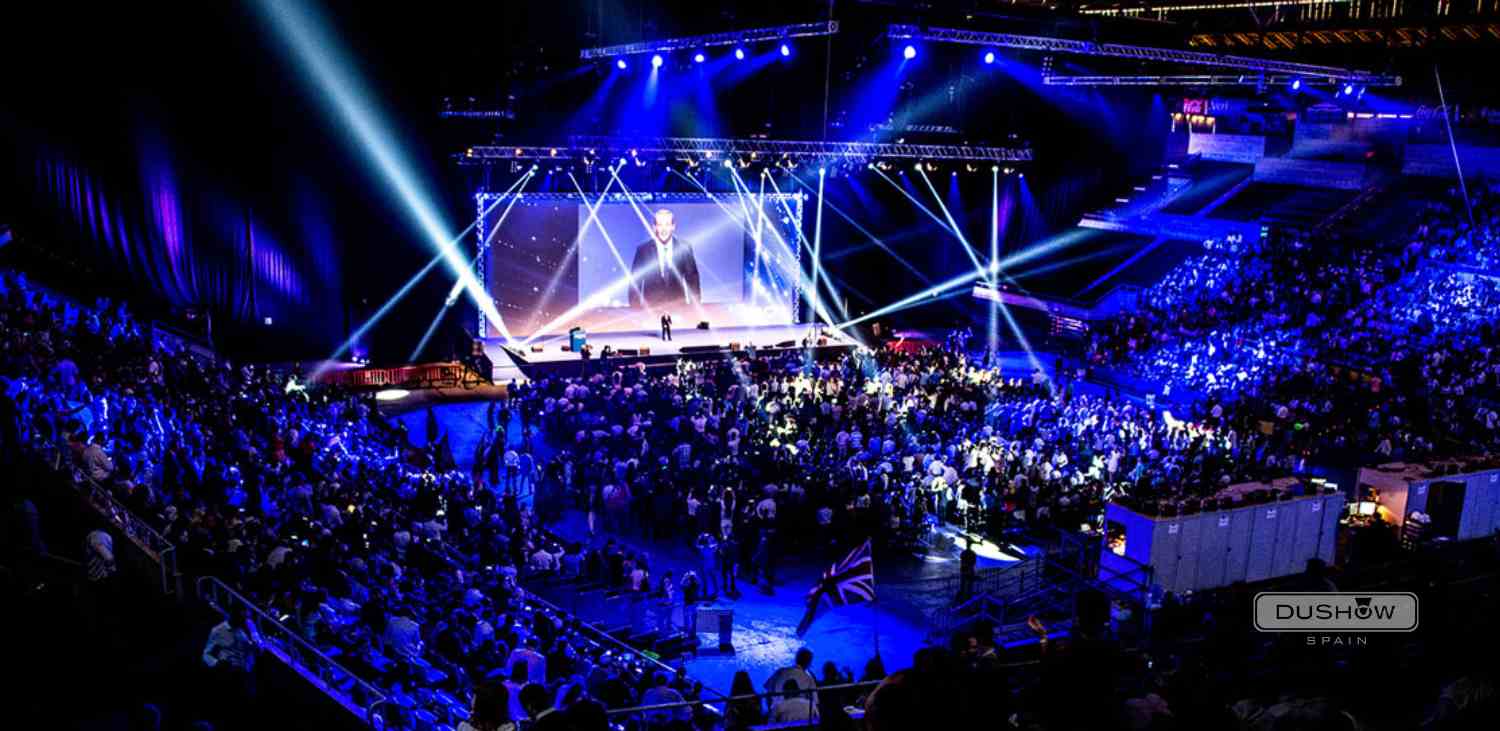Exactly How Event Production Works: A Comprehensive Consider the Process
Event production is a complicated and organized procedure that needs careful preparation and execution. It starts with establishing clear purposes and recognizing the target audience. Each action, from budgeting to place choice, plays an essential role in making sure success. As the procedure unravels, numerous aspects should align perfectly. The nuances of this complex procedure commonly go undetected. What are the key stages that contribute to an unforgettable event?

The First Drawing Board
When starting on event production, careful planning is vital to guarantee a successful outcome. The initial drawing board serves as the structure for all succeeding efforts. Throughout this phase, event manufacturers have to specify the event's purpose and goals clearly. Recognizing the target market assists customize the experience and messaging, guaranteeing relevance and engagement.Producers have to additionally consider the event style, whether it be in-person, virtual, or crossbreed, as this will affect numerous logistical aspects. Choosing an ideal day and venue is important, as it influences availability and availability.Furthermore, constructing a reputable group is fundamental for splitting duties and enhancing communication. Establishing a timeline with turning points assurances all tasks are finished on routine. This phase involves complete research study, consisting of identifying prospective obstacles and developing methods to alleviate threats. Inevitably, a well-structured preliminary preparation stage sets the tone for an effective event production journey.

Budgeting and Source Allocation
In event production, effective budgeting and resource allotment are essential for success - event production charlotte. Establishing monetary criteria establishes the foundation for all succeeding choices, while resource circulation approaches guarantee that every component of the event is sufficiently sustained. Together, these components assist preserve control over expenditures and maximize the usage of readily available sources
Establishing Financial Parameters
Developing financial specifications is vital to the success of any event production, as it sets the structure for effective budgeting and source appropriation. This procedure begins with specifying the overall budget, which encompasses all aspects of the event, consisting of place expenses, catering, and advertising. By identifying available funds, event coordinators can prioritize expenditures and allot sources as necessary. On top of that, it is important to perform extensive market study to prepare for possible costs and recognize financing sources, such as sponsorships or ticket sales. Establishing clear monetary specifications likewise aids in risk management, enabling coordinators to reserve backup funds for unexpected expenditures. Inevitably, a well-defined budget plan functions as a roadmap, leading the event production group in the direction of achieving their goals while preserving monetary control.
Resource Circulation Strategies
Effective resource circulation techniques are necessary for maximizing the influence of an event while sticking to budget restrictions. Successful event production needs a precise strategy to budgeting and source allotment. Organizers need to prioritize vital aspects such as place, event catering, and modern technology, ensuring that funds are designated to areas that enhance attendee experience. A thorough budget plan must lay out anticipated expenses and recognize locations for potential price financial savings, such as discussing with suppliers or exploring sponsorship chances. Additionally, tracking expenses throughout the preparation procedure aids prevent overspending. By using strategic source circulation, event producers can deliver an unforgettable experience while maintaining fiscal obligation, eventually adding to the total success of the event.
Place Option and Logistics
Picking the appropriate place is important to the success of any type of event, as it sets the stage for the general experience. Location choice includes assessing various elements, including capacity, accessibility, and area. Organizers have to think about the target audience and the nature of the event, guaranteeing the venue straightens with the event's goals.Logistics play a substantial function in this process, including setups for seats, audiovisual devices, and catering solutions. An appropriate venue should promote smooth flow for attendees and team, improving engagement.Additionally, evaluating potential places for facilities like car parking, restrooms, and fire escape is important for safety and security and comfort. The timeline for securing the place is also critical, as prominent locations might book swiftly - event production charlotte. As a result, thorough preparation and timely execution can inevitably contribute to a smooth event experience, making venue option and logistics fundamental elements of effective event production
Imaginative Concept Advancement
While the place establishes the physical stage, innovative principle development shapes the event's identification and story. This procedure begins with determining the event's objective and target market, allowing event producers to develop an engaging theme that resonates with participants. Brainstorming sessions typically consist of varied perspectives, promoting cutting-edge concepts that align with the event's goals.Once a style is developed, aesthetic elements such as color combinations, signs, and design are made to enhance the overall atmosphere. Storytelling techniques may also be integrated to produce an appealing journey for participants, ensuring an unforgettable experience. Furthermore, considerations relating to amusement, tasks, and interactive parts are lined up with the selected idea, strengthening the style throughout the event.Ultimately, effective creative concept growth warranties that every facet of the event works cohesively, leaving a long lasting impression on attendees and meeting the event's purposes. This fundamental work prepares for succeeding preparation and execution stages.
Teaming up With Suppliers and Providers
Successful event production rests on efficient collaboration with suppliers and providers. Selecting reliable companions, discussing contracts properly, and making sure timely distributions are important steps in this procedure. Each of these aspects contributes substantially to the general success and smooth implementation of an event.
Picking Reliable Partners
How can event coordinators guarantee a smooth production experience? Selecting trusted partners is essential in accomplishing this objective. Event coordinators have to carry out thorough research study to identify vendors and distributors with a tested track document of excellence. This includes examining references, examining profiles, and assessing client feedback. Coordinators must focus on partners who show expertise, timely communication, and a readiness to collaborate. Building strong connections cultivates trust and allows fast analytic throughout the event. Additionally, it is useful to pick neighborhood suppliers who understand the location and local logistics. Eventually, an effective event pivots on the harmony in between coordinators and their companions, making sure that every visit here facet of production runs efficiently and successfully.
Bargaining Agreements Effectively
Effective negotiation of contracts is a vital step in the collaboration between event coordinators and their suppliers and suppliers. This process involves clear communication of assumptions, deliverables, and timelines. Planners need to perform extensive research study on market prices and sector criteria to develop a baseline for settlements. It is essential to produce a collective environment, encouraging open dialogue concerning terms, pricing, and potential backups. Coordinators need to likewise prioritize understanding the vendor's capacities and restrictions to straighten their requirements properly. Adaptability can result in equally beneficial contracts, cultivating lasting partnerships. Crafting well-defined agreements that consist of certain performance metrics can assist guarantee responsibility, ultimately resulting in successful event implementation and satisfaction for all celebrations entailed.
Making Certain Prompt Deliveries
Timely deliveries are essential for the smooth execution of any event, requiring persistent partnership between coordinators and their vendors and vendors. Reliable communication is important, as it assists establish clear expectations relating to shipment schedules, quantities, and specific needs. Planners usually develop comprehensive timelines to lay out critical turning points, making sure all events stay straightened throughout the procedure. Normal check-ins with suppliers can assist identify prospective delays early, permitting proactive remedies. Additionally, constructing solid relationships with dependable providers promotes depend on and liability, which can cause far better service and prioritization. By prioritizing these collaborative initiatives, planners can lessen disruptions, therefore improving the overall performance of event production and ensuring that all essential materials and services arrive as intended.
Advertising And Marketing and Promotion Techniques
While arranging an event, the success of marketing and promotion techniques can greatly affect attendance and interaction. Efficient techniques usually consist of a mix of electronic marketing, standard advertising, and grassroots outreach. Making use of social Full Report media sites platforms enables for real-time communication and targeted advertising, reaching certain demographics effectively. Email marketing campaigns can even more engage possible participants with personalized content and reminders.Collaborations with influencers or industry leaders can additionally improve reliability and expand reach. Developing engaging material, such as videos or blogs, aids to create buzz and sustain passion leading up to the event. Additionally, leveraging early-bird discount rates and special perks can incentivize ticket purchases.Promoting through standard channels, such as posters or neighborhood media, stays appropriate, particularly in community-focused events. A comprehensive technique that integrates multiple methods guarantees optimum presence and involvement, inevitably adding to the event's success and the production of a memorable experience for attendees.
On-Site Execution and Management
On-site implementation and monitoring are necessary parts that determine the total success of an occasion. Reliable control during the event ensures that all elements line up with the intended schedule. Event supervisors supervise logistics, consisting of vendor sychronisation, devices arrangement, and guest solutions. Checking timelines and resolving any type of unexpected issues are essential for preserving a smooth experience.The staff plays a significant function, as experienced employees are in charge of numerous jobs such as enrollment, info circulation, and technological support. Communication among staff member is vital; it promotes a joint atmosphere and makes it possible for quick resolution of challenges.Additionally, safety methods must be followed, guarding the wellness of all participants. Post-event evaluations are likewise part of on-site management, providing understandings for future improvements. By focusing on these aspects, event manufacturers can produce remarkable experiences that satisfy or exceed participant expectations while achieving the event's objectives.
Regularly Asked Inquiries
Exactly how Do I Pick the Right Event Style?
Choosing the best event theme includes taking into consideration the target audience, event purpose, and venue. Looking into present fads and collecting input from stakeholders can additionally inspire creative concepts that reverberate and produce an unforgettable experience.

What Prevail Errors in Event Production?
Common mistakes in event production usually consist of poor planning, inadequate communication among staff member, budget plan mismanagement, neglecting to take into account the audience's needs, this hyperlink and stopping working to carry out a comprehensive post-event evaluation for future enhancements.
Exactly How Can I Gauge Event Success?
To determine event success, one can assess participant satisfaction, engagement levels, spending plan adherence, and post-event feedback. Secret efficiency indications, such as ticket sales and social networks communications, also provide beneficial understandings right into overall performance.
What Should I Do if It Moistens the Event Day?
In the event of moisten the day, the organizer ought to apply contingency strategies, such as securing tents or relocating tasks inside. Interaction with attendees about changes is necessary to assure a smooth experience despite weather challenges.
How Can I Make Sure Guest Interaction Throughout the Event?
